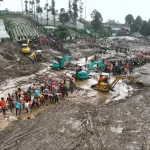Liga Asuransi – Dear readers, how are you?
We are again shocked by accidents in oil and gas transportation in Indonesia. Yesterday a fuel oil tanker caught fire, damaging the hull and the cargo. This accident followed a massive fire in an oil storage tank in Plumpang Jakarta earlier this month.
The MT Kristin Surabaya oil tanker carrying Pertalite fuel oil caught fire in Mataram, West Nusa Tenggara (NTB), Indonesia, Sunday (26/3/2023) at around 14.45 local time.
The ship belongs to the carrier service company PT Andin Jaya Mandiri.
MT Kristin Surabaya carried 5,900 kiloliters of “Pertalite” fuel oil to be unloaded to Benoa Bay in Bali. However, because the Benoa terminal depot was fully occupied, the filling was diverted to the Pertamina Ampenan depot, about 150 km away.
While the ship was waiting to unload the fuel, three crew members headed to the front deck to lower anchor. Suddenly an explosion caused the front of MT Kristin Surabaya to catch fire.
As a senior insurance broker focusing on the oil and gas industry, I am deeply concerned about this accident, especially for the families of the victims of the death of the three crew members.
I want to discuss this accident concerning risk management and insurance related to this disaster. This article can be an insight to all parties so that incidents like this do not happen again.
If you are interested in this article, please share it with your friends, so they know like you.
THE PROBABLE CAUSES OF THE FIRE
Because the accident has just occurred recently, the cause of the fire has yet to be ascertained. But to find out the cause of the fire, in theory, we can use existing experience.
There are several probable causes of fires on oil tankers, which can include:
- Human Error
Human error is one of the most common causes of fires on oil tankers. It can happen due to a lack of proper training or negligence by the crew members or workers.
- Electrical Faults
Electrical faults can occur due to electrical equipment or wiring failure, resulting in short circuits or electrical arcing that may ignite flammable materials.
- Mechanical Failure
Mechanical failures of equipment or machinery, such as pumps or valves, can lead to the release of flammable materials and may cause a fire.
- Chemical Reactions
Chemical reactions can also cause fires on oil tankers. Certain chemicals or substances can react with each other, leading to a release of heat and fire.
- Weather Conditions
Extreme weather conditions, such as lightning strikes or storms, can cause a fire on an oil tanker.
It is important to note that the exact cause of a fire on an oil tanker can be determined only after an expert investigation.
THE RISKS OF OIL TANK
Transporting large quantities of oil poses significant risks to the environment, human health, and property. Some potential risks involved in transporting oil include:
- Accidents and spills
Oil tankers are vulnerable to accidents such as collisions, grounding, or equipment failure, leading to oil spills that can cause severe environmental damage and threaten marine life and habitats.
- Fire and explosions
Oil is highly flammable and can ignite or explode if not handled properly. A fire or explosion on an oil tanker can cause loss of life, significant property damage, and severe environmental consequences.
- Theft and piracy
Oil is a valuable commodity and is vulnerable to theft and piracy. Armed attacks on oil tankers can endanger crew members and cause significant financial losses.
- Terrorism and sabotage
Oil tankers are potential targets for terrorist attacks or sabotage, which can result in significant loss of life and property damage.
To mitigate these risks, several steps can be taken, including:
- Training and Education
Crew members should be trained on the safe handling and transportation of oil and how to respond to emergencies.
- Regular maintenance and inspections
Oil tankers should be regularly inspected and maintained to ensure they are in good condition and the equipment works correctly.
- Compliance with regulations
The shipping industry is regulated to prevent oil spills and other incidents. Compliance with regulations is necessary to ensure safe transportation.
Emergency response planning
A comprehensive emergency response plan should be developed and practiced in case of an incident.
- Security measures
Oil tankers should be equipped with security measures to prevent theft and piracy, including proper lighting, fences, and alarms.
By taking these steps, the risks associated with transporting large quantities of oil can be reduced, and the likelihood of incidents minimized.
THE TYPES OF INSURANCE NEEDED FOR THE OIL TANKER
Oil tankers are exposed to significant risks, so the shipping industry typically requires various types of insurance to protect against potential losses. Some of the types of insurance and coverage needed for oil tankers include:
- Hull and Machinery Insurance
This insurance covers physical damage to the vessel itself, including damage resulting from accidents, fire, and collisions.
- Protection and Indemnity (P&I) Insurance
This insurance covers third-party liability, including pollution and environmental damage, personal injury or death, and loss or damage to cargo.
- War Risk Insurance
This insurance provides coverage for losses resulting from acts of war or terrorism, including damage caused by mines, sabotage, or hijacking.
- Loss of Hire Insurance
This insurance covers loss of income from damage or loss to the vessel.
- Cargo Insurance
Marine Cargo Insurance covers the value of the cargo transported in case of damage or loss.
- Cyber Risk Insurance
This insurance covers losses from cyber-attacks or data breaches, which are becoming increasingly common in the shipping industry.
The specific insurance coverage required for oil tankers may vary depending on the size and type of vessel, the routes taken, and the cargo being transported. Shipping companies must work with experienced insurance brokers to identify and secure appropriate coverage against potential losses.
THE IMPACT OF THE FIRE
The impacts of a fire accident on an oil tanker can be severe, both in terms of human and environmental consequences and economic costs. The implications of such an incident on the shipping industry are also significant. Here are some possible impacts and implications:
- Human and Environmental Impacts
A fire accident on an oil tanker can cause loss of life, injuries, and severe environmental damage. Oil spills from the fire can long-term impact marine life and habitats, fisheries, and local economies that depend on the affected ecosystem.
- Economic Costs
The economic costs of a fire accident on an oil tanker can be substantial. The damaged vessel may need to be repaired or replaced, and high costs may be associated with cleaning up the spill and compensating affected parties.
- Regulatory Implications
A significant incident, such as a fire accident on an oil tanker, can lead to increased regulation and scrutiny of the shipping industry. This can result in stricter safety and environmental regulations, increased enforcement efforts, and potentially higher compliance costs for shipping companies.
- Insurance Implications
A fire accident on an oil tanker may impact insurance rates and coverage availability. The cost of insurance coverage may increase, and some insurers may become more hesitant to offer coverage for similar risks.
- Reputation Impacts
The reputation of shipping companies involved in a fire accident can be negatively impacted, resulting in a loss of business and reduced trust from customers and stakeholders.
- Supply Chain Disruptions
A fire accident on an oil tanker can disrupt supply chains and lead to essential goods and product shortages. This can result in higher costs for businesses and consumers, potentially leading to broader economic impacts.
The impacts of a fire accident on an oil tanker can be far-reaching and severe, both in terms of human and environmental consequences and economic costs. The incident can also have significant implications for the shipping industry, including increased regulation, insurance costs, and supply chain disruptions. Shipping companies must prioritize safety and risk management to prevent such incidents and minimize their potential impacts.
IMPACT ON THE ENVIRONMENT
The impact of a fire on an oil tanker on the environment can be significant and long-lasting. Here are some potential effects:
- Oil Spills
A fire on an oil tanker can result in oil spills, severely impacting marine ecosystems and habitats. Oil can smother and kill marine life, including fish, birds, and mammals, and can also contaminate shorelines and wetlands.
- Water Pollution
The smoke and heat from the fire can release toxic chemicals and pollutants into the air and water, contaminating waterways and negatively impacting water quality.
- Air Pollution
The smoke and emissions from the fire can release pollutants into the air, impacting air quality and harming human health.
- Climate Change
Burning fossil fuels on the tanker can contribute to greenhouse gas emissions, exacerbating climate change.
- Economic Impacts
Environmental damage from a fire on an oil tanker can have significant economic impacts, including the loss of fishing and tourism industries and the costs of cleaning up the spill.
- Long-term Effects
Environmental impacts from oil spills can last for years and sometimes decades. This can have long-term consequences for the affected ecosystems, including reduced biodiversity and productivity.
A fire on an oil tanker can have significant and lasting environmental impacts, including oil spills, water, and air pollution, and contributions to climate change.
The shipping industry must prioritize safety and risk management to prevent such incidents and minimize their potential impacts. In the event of an incident, rapid and effective response measures can help mitigate environmental damage and promote a faster recovery.
THE INSURANCE BROKER RESPONSIBLE
In the event of an oil tanker fire accident, an insurance broker would play an essential role in managing the claim on behalf of the insured party. Here are some steps an insurance broker might take:
- Notification and Investigation
The broker would be notified of the claim and would immediately begin investigating the incident to gather all the relevant details and information.
- Coverage Analysis
The broker would analyze the insurance policies to determine the applicable coverages and exclusions. They would also work with the insured to identify any potential coverage issues and assess the adequacy of the coverage limits.
- Loss Assessment
The broker would assess the extent of the loss and work with the insurer to determine the value of the damages, including the costs associated with repairing or replacing the damaged vessel, cleaning up the spill, and compensating affected parties.
- Claims Negotiation
The broker would work with the insurer to negotiate a fair and reasonable settlement for the insured party.
- Legal Support
In the event of a dispute, the broker would provide legal support to the insured party, including working with attorneys to manage the legal process.
- Communication
The broker would inform the insured party throughout the claims process and provide regular updates on the claim’s progress.
An insurance broker would be critical in managing an oil tanker fire accident claim. They would work to ensure that the claim is handled efficiently and effectively and that the insured party receives the appropriate coverage and compensation.
The insurance broker‘s expertise and experience would help protect the insured party’s interests throughout the claims process.
This article is presented by L&G Insurance Broker.
—
LOOKING FOR INSURANCE PRODUCTS? DON’T WASTE YOUR TIME AND CALL US RIGHT NOW
24-HOUR L&G HOTLINE: 0811-8507-773 (CALL – WHATSAPP – SMS)
website: lngrisk.co.id
E-mail: customer.support@lngrisk.co.id
—



















